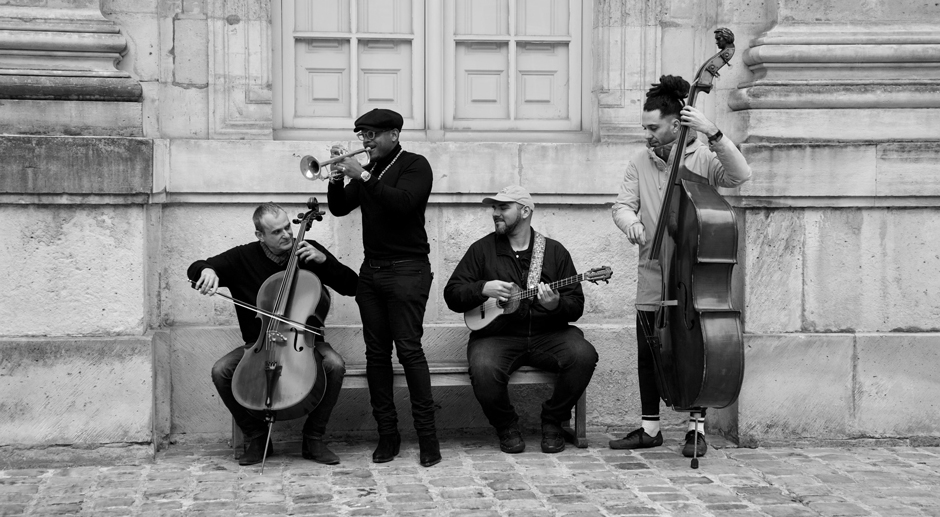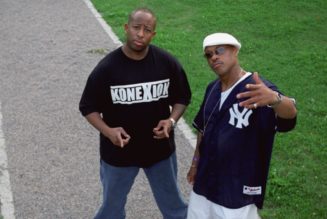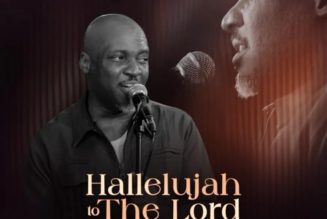Migrations are risky, often tragic attempts to escape a horrific situation—war, abuse, violence, or dire poverty. Fueled by the desperate dream for a new life in a new land, migrants abandon family and friends and suffer loss, alienation, and worse.
Yet, as is the tragic irony of history, even the worst human travesty births some redemptive thread. Some trace of beauty survives the struggle.
That trace of resonant beauty is at the heart of the latest creative composition of Etienne Charles, an associate professor of studio music and jazz at the University of Miami Frost School of Music.
“Traces,” the renowned trumpeter and composer’s eighth album, musically explores the stories of African and Sephardic migrations between the Caribbean and South America and the resulting musical connections.
“The theme of loss is there, yet also those of wandering and of gain because you’re in a new land and a new space and you’ve become part of a new hybrid culture,” Charles explained. “My music is all about a new world because I don’t work within the confines, as a composer or musician, of Western European models. I don’t use those confines simply because I am of the New World and a product of numerous Creole cultures.”
The “Traces” project is an extension of his decade-long exploration of the African diaspora and drawing lines to the regions at the roots of migration. “It’s about all of the different things that contribute sonically, culturally, and physically to the Creole experience,” added Charles, emphasizing that “Creole” by definition refers to anyone, regardless of racial designation, born in the colonies of the so-called “New World.”
Charles, originally from Trinidad, is joined on the album by a trio of world-class musicians. They include Vincent Ségal (France), Jorge Glem (Venezuela), and Or Bareket (Israel)—all whose lives have been personally impacted by the migration patterns the music explores.
Those migrations launched in large part from Spain in 1492 when royal decrees, later formalized as the Spanish Inquisition, forced the mass expulsion of between 100,000 to 300,000 Jews and Muslims. Many Sephardic Jews fled to places like Holland and, from there, to the Dutch Antilles, specifically Suriname, Curacao, and Aruba—the first places in the western hemisphere to have Jewish people, Charles pointed out.
In 2018, University architecture students helped document the history of the oldest Jewish synagogue in Curacao.
The album celebrates a number of the musical fusions prompted by these migration patterns. With Charles on trumpet and cajon, Ségal on cello, Glem on the cuatro, Venezuela’s national instrument, and Bareket on bass, the quartet’s unique instrumentalization delivers a sonic gumbo of rhythms and song styles. They include Antillean Waltz (Trinidad), Choro (Brazil), Biguine (Martinique), Aleke (French Guiana), and Merengue (Venezuela).
“Each track has its own narrative,” Charles pointed out. “We move from Peru to Brazil to Venezuela to Morocco to North America, and it’s all very rhythmic and groove based.Each movement is based on a groove,” he added. “These are not just about Sephardic migrations, but also about those from Africa. And at the end of the day, it’s about how these diaspora groups became Creole groups here in the Caribbean and the Americas.”
The album is the fruit principally of a French-American Jazz Exchange (FACE) grant that Charles received, based on the project proposal he wrote, in 2018. The grant calls for the creation of new works and promotes exchange between a U.S. artist and one based in France.
Charles was well aware of Segal’s virtuosity as a classical cellist who had immersed himself in a variety of musical traditions and his talent as a composer of original music for films. In addition, he was cognizant of Bareket’s reputation as a premier bassist, bandleader, and composer and also of his background. He was born in Jerusalem to parents of Moroccan, Iraqi, Argentine, and Eastern European descent, and raised between Buenos-Aires, Argentina, and Tel-Aviv, Israel. Glem’s exceptional talent as a Latin Grammy-winning cuatro player, mandolinist, and musical producer served to compose his ideal quartet.

“I knew I wanted to put this together with this specific instrumentalization—trumpet, cuatro, cello, and bass,” he recalled. “There’s none other like it that I know about, and these were the musicians I wanted to play with.”
To date, “Traces” has been performed at venues in Paris, Miami, Trinidad, at the Savannah Music Festival, and at Vassar College in Poughkeepsie, New York, and at Garth Newel Music Center in Warm Springs, Virginia, according to Charles.
At performances, Charles is keen to introduce the tunes and their musical influences to audiences.
“This record is about transporting people to a different place at a different time,” he said. “One of the main things I’ve tried to do with my music is to bring people together from different walks of life and then to show them something they may not have known about.”
He strives for the album’s music to serve as a kind of therapy.
“It’s about putting you in a trance by locking you into a groove so that you feel completely engrossed in the music. The intention is that when you walk out, you feel like you just got a massage and like something happened,” he said.
Yet, he intends with this album, as he does generally in his compositions, for the music to provoke thought and reflection for both himself and audiences.
“The music is about all those different things that help create ideas and provoke thought,” he said. “[Before I started researching] I didn’t know that Jewish people went to the Caribbean before they came to America.”
Charles is not a fan of the streaming companies because of their financial models that he said does little to compensate artists and creators.
“I own all of my music and am in a unique position because I’ve never worked with a record label,” said Charles, who joined Frost in the fall of 2021. “I’m just doing my little part to protect my music.”
He plans to deliver “Traces” tracks, each supported by high-quality video presentation, through a subscription-based model offered through his website.









